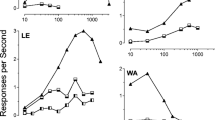Summary
The effects of amobarbital and chlorpromazine were studied on punished behavior in the pigeon. Key-pecking responses, maintained by a variable-interval schedule of food reinforcement, were punished by brief electric shocks. Under this simultaneous food and punishment schedule, responding is suppressed and occurs at a fairly uniform rate that is inversely related to the punishment intensity. Amobarbital partially restores responding suppressed by punishment, but chlorpromazine has no tendency to attenuate suppression by punishment.
Similar content being viewed by others
References
Azrin, N. H.: A technique for delivering shock to pigeons. J. exp. Anal. Behav. 2, 161–163 (1959).
—: Effects of punishment intensity during variable-interval reinforcement. J. exp. Anal. Behav. 3, 123–142 (1960).
Cook, L., and R. T. Kelleher: Effects of drugs on behavior. Ann. Rev. Pharmacol. 3, 205–222 (1963).
Dews, P. B.: Effects of chlorpromazine and promazine on performance on a mixed schedule of reinforcement. J. exp. Anal. Behav. 1, 73–82 (1958a).
—: Analysis of effects of psychopharmacological agents in behavioral terms. Fed. Proc. 17, 1024–1030 (1958b).
—: A behavioural output enhancing effect of imipramine in pigeons. Int. J. Neuropharmacol. 1, 265–272 (1962).
- A behavioral effect of amobarbital. Naunyn-Schmiedebergs Arch. exp. Path. Pharmak. (in press).
—, and W. H. Morse: Behavioral pharmacology. Ann. Rev. Pharmacol. 1, 145–174 (1961).
Eddy, N. B.: Studies on hypnotics of the barbituric acid series. J. Pharmacol. exp. Ther. 33, 43–68 (1928).
Ferster, C.B., J. B. Appel, and R. A. Hiss: The effect of drugs on a fixed-ratio performance suppressed by a pre-time-out stimulus. J. exp. Anal. Behav. 5, 73–88 (1962).
—, and B. F. Skinner: Schedules of reinforcement. New York: Appleton-Century-Crofts 1957.
Geller, I., E. Bachman, and J. Seifter: Effects of reserpine and morphine on behavior suppressed by punishment. Life Sci. 4, 226–231 (1963).
—, J. T. Kulak, and J. Seifter: The effects of chlordiazepoxide and chlorpromazine on a punishment discrimination. Psychopharmacologia (Berl.) 3, 374–385 (1962).
—, and J. Seifter: The effects of meprobamate, barbiturates, d-amphetamine and promazine on experimentally induced conflict in the rat. Psychopharmacologia (Berl.) 1, 482–492 (1960).
Kelleher, R. T., W. Fry, J. Deegan, and L. Cook: Effects of meprobamate on operant behavior in rats. J. Pharmacol. exp. Ther. 133, 271–280 (1961).
—, W. C. Riddle, and L. Cook: Observing responses in pigeons. J. exp. Anal. Behav. 5, 3–13 (1962).
Morse, W. H.: Use of operant conditioning techniques for evaluating the effects of barbiturates on behavior. In First Hahnemann Symposium on Psychosomatic Medicine. J. H. Nodine and J. H. Moyer (Eds.). Philadelphia: Lea & Febiger 1962.
Naess, K., and E. W. Rasmussen: Approach-withdrawal responses and other specific behaviour reactions as screening test for tranquillizers. Acta pharmacol. (Kbh.) 15, 99–114 (1958).
Waller, M.: Effects of chronically administered chlorpromazine in multiple-schedule performance. J. exp. Anal. Behav. 4, 351–360 (1961).
—, and W. H. Morse: Effects of pentobarbital on fixed-ratio reinforcement. J. exp. Anal. Behav. 6, 125–130 (1963).
Author information
Authors and Affiliations
Additional information
This work was supported by grants MH 02904 and MH 07658 from the U.S. Public Health Service and by a research career program award 5-K3-GM-15, 530 from the Institute of Mental Health.
Rights and permissions
About this article
Cite this article
Morse, W.H. Effect of amobarbital and chlorpromazine on punished behavior in the pigeon. Psychopharmacologia 6, 286–294 (1964). https://doi.org/10.1007/BF00413158
Received:
Issue Date:
DOI: https://doi.org/10.1007/BF00413158




